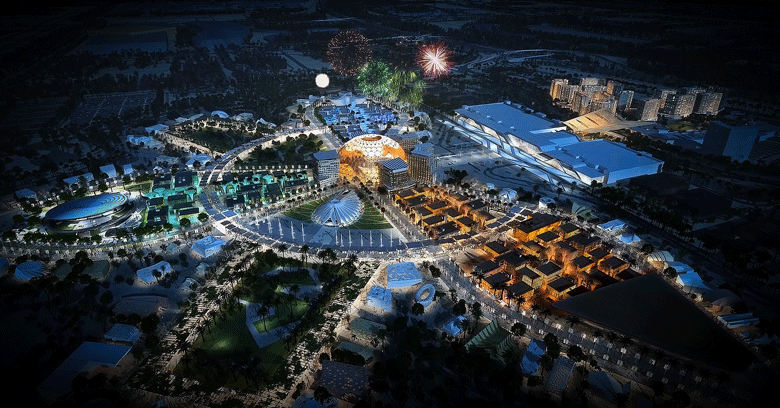

Expo 2020 Dubai promises to be the largest world expo in the event’s 167-year history. The venue will occupy a 4.38 square-kilometre site in Dubai South, and some 30,000 volunteers will welcome an average of 150,000 daily visitors when the six-month-long show begins on 20 October 2020.
Compared to previous events, Expo 2020 Dubai also promises to be the most connected and interactive, as it seeks to adhere to three themes: sustainability, mobility and opportunity.
Physical infrastructure
The challenge has already begun with the construction phase. In addition to structures such as Al-Wasl Plaza, where the main opening event will be held, each of the 190 participating countries will build their own pavilions.
 The majority of more than 50 construction contracts have been awarded, with the rest expected to be awarded this year.
The majority of more than 50 construction contracts have been awarded, with the rest expected to be awarded this year.
An estimated 40,000 construction workers will be on site starting 2019, in addition to those working on the Dubai Metro Route 2020 and on the road interchanges that will link the venue to Sheikh Mohammed bin Zayed Road and Jebel Ali Lehbab Road. An estimated 70 per cent of visitors to Expo 2020 will be coming from overseas, compounding the challenge faced by organisers.
The event presents a lot of unknowns, a vice-president for US-based Expo 2020 logistics partner UPS, Alan Williams, told a local publication. “The best way to explain event logistics is that if you have a venue and you turn the site upside down, everything that falls out of that site apart from the people is probably put there by logistics,” he explained.
In addition to expanding its Middle East headcount from 12 to 1,000 in the run-up to the event, UPS is planning a dedicated warehouse at the expo site to store everything from air conditioner bolts to building supplies. The company’s largest freighter has begun daily non-stop flights from the US to Dubai. The firm is also testing technologies such as robotics, drones and electric cars in its European laboratory with a view to introducing them at the expo site.
Digital integration
The use of advanced technologies will permeate the event. The Expo Bureau has assembled technology suppliers, including US-based Accenture and Cisco, and Germany’s Siemens and SAP, to plan, install and maintain the hardware and software required for the event.
An Expo 2020 ‘smart site’ will offer visitors multiple channels to purchase tickets and then design a customised itinerary based on the pavilions a visitor plans to visit, with individual transport and language preferences. Once visitors, employees and volunteers arrive at the pedestrian-only venue, a wayfinding application will help them find their way around the various pavilions, events and food and beverage (F&B) outlets.
[caption id="attachment_326437" align="alignleft" width="780"] The recently launched Dubai Exhibition Centre[/caption]
The recently launched Dubai Exhibition Centre[/caption]
Other systems that Expo 2020 is looking to deploy include specialised simulation software to model crowd behaviour, video analytics to monitor crowd numbers, and an anonymous tracking software to predict the number of people in any given area. A system for ordering and paying for F&B, and for ensuring sufficient inventory on the F&B suppliers’ side, is also included in the plan. A ‘superstore of the future’ will also offer visitors more than 5,000 licensed products on site and online.
Siemens is building an Expo 2020 digital twin using Mindsphere, its industrial internet-of-things platform. This will capture a near-live representation of engineering data coming from hundreds of contractors and suppliers, and from sensors installed in air conditioning systems, smart meters, metro ticketing machines and so on, in order to enable “effective energy and building management” throughout the community.
The Expo 2020 site is already connected to telecom firm Etisalat’s 5G network, a crucial factor in enabling all the planned applications to work, and in handling internet traffic at the venue.
The connectivity and interaction desired for the event requires a high level of physical and cyber security. Abu Dhabi-based DarkMatter has been mandated to safeguard digital transactions at the event by providing monitoring, risk assessment and digital forensics before, during and after the expo.
The firm’s methodology is based on its “cyber transformation framework, scanning for many known and unknown attack vectors”, senior vice-president of business development at DarkMatter, Rabih Dabboussi, tells MEED.
“Expo 2020 is progressively becoming cyber-ready as the digital Expo 2020 expands hand-in-hand with the physical development.”
Expo 2020 legacy
To ensure the estimated AED25bn ($6.8bn) investment in Expo 2020 outlives the six-month event, up to 80 per cent of the built structures will become part of District 2020, a masterplanned community that will include residences and commercial spaces. Al-Wasl Plaza will be converted into an exhibition and concert venue, while the Sustainability Pavilion will become the District 2020 Children & Science Centre.
An Innovation Impact Grant Programme (IIGP), which provides a $100,000 grant to innovators and entrepreneurs, has been launched to ensure the expo’s legacy includes key elements of the information and operational technology infrastructure, as well as its physical infrastructure.
As of 2018, IIGP has provided grants to 70 innovators in 42 countries. These include a Brazilian project that is developing a portable talking computer to assist visually impaired people, and a UAE-based startup that has created a mobile application to help blue-collar workers improve their reading and writing skills.
You might also like...

Al Ula seeks equestrian village interest
26 April 2024

Morocco seeks firms for 400MW wind schemes
26 April 2024

Countries sign Iraq to Europe road agreement
26 April 2024

Jubail 4 and 6 bidders get more time
26 April 2024
A MEED Subscription...
Subscribe or upgrade your current MEED.com package to support your strategic planning with the MENA region’s best source of business information. Proceed to our online shop below to find out more about the features in each package.








